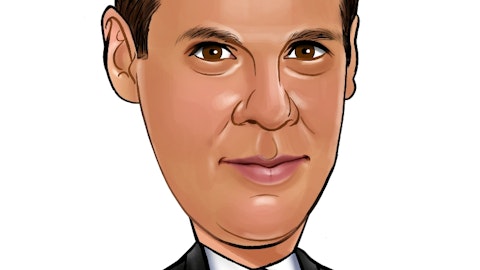Who likes AbbVie (NYSE:ABBV) stock? AbbVie does! In fact, this pharmaceutical industry big-cap likes itself so much, it’s planning to buy back $5 billion worth of its own stock.
AbbVie is one of the 50 most popular stocks among hedge funds. It has seen a surge in hedge fund interest during the first quarter. Billionaire Larry Robbins, healthcare hedge fund managers Alex Denner and James Flynn were among the hedge funds that initiated brand new positions in the stock. ” We believe the company is widely misunderstood and, as a result, materially undervalued and we also see an opportunity for AbbVie to evolve and capitalize on some of the proven mechanisms to drive long-term shareholder value that the “New School” pharma names are capitalizing upon currently,” Larry Robbins said about Abbvie in Glenview’s first quarter investor letter. This is one of the reasons why we started paying more attention to developments regarding Abbvie.
Follow Larry Robbins's Glenview Capital
In a May 26 filing with the SEC, AbbVie announced that it has contracted with Morgan Stanley to have the latter deliver to it “approximately 68 million shares” of AbbVie stock. In exchange, AbbVie will pay Morgan Stanley $5 billion.
All of this is related to AbbVie’s just-closed cash-and-stock purchase of Pharmacyclics Inc., and to AbbVie’s desire to quickly whittle down the number of shares it paid Pharmacyclics shareholders in compensation for their shares of the latter. As recently as March, AbbVie had announced plans to repurchase $10 billion worth of stock. So this week’s announced deal with Morgan Stanley represents an attempt to acquire half the stock desired, all in a single transaction.
In its SEC filing, AbbVie clarified that 68 million shares, for $5 billion, may not be the final terms of this deal: “Morgan Stanley may be required to deliver additional shares of AbbVie’s common stock to AbbVie or, under certain circumstances, AbbVie may be required to deliver shares of its common stock or may elect to make a cash payment to Morgan Stanley. The total number of shares of AbbVie’s common stock to be repurchased under the agreement will be based on the daily volume-weighted average price of AbbVie’s common stock during the term of the transaction, less a discount and subject to adjustment pursuant to the terms of the agreement.”
So while precisely how much AbbVie pays for the shares, and precisely how many shares it repurchases, remains to be seen, the broad outlines of the accelerated repurchase deal are in place, and AbbVie expects to complete this large portion of its repurchase plan before the end of this year.
What does it mean to you?
Now let’s step back for a moment and take a look at the bigger picture. AbbVie’s $10 billion repurchase plan, viewed as a whole, represents a plan to buy back roughly 9.5% of the $105 billion-company’s stock. That sounds like good news for shareholders, inasmuch as fewer shares outstanding will mean fewer shares among which future profits are divided — i.e., more profit per share for shareholders.
However, shareholders will pay a high price for these higher profits. At last report, Yahoo! Finance figures put AbbVie’s per-share P/E at more than 59, a richer valuation than the average in the drug industry. At the same time, Yahoo! data show that AbbVie’s projected earnings growth rate of 15% is slower than the near-19% pace expected elsewhere in the industry.
It all adds up to a big reduction in share count, true. But it adds up to a big price tag on those shares as well.
This $19 trillion industry could destroy the Internet
One bleeding-edge technology is about to put the World Wide Web to bed. And if you act quickly, you could be among the savvy investors who enjoy the profits from this stunning change. Experts are calling it the single largest business opportunity in the history of capitalism… The Economist is calling it “transformative”… But you’ll probably just call it “how I made my millions.” Don’t be too late to the party — click here for one stock to own when the Web goes dark.


